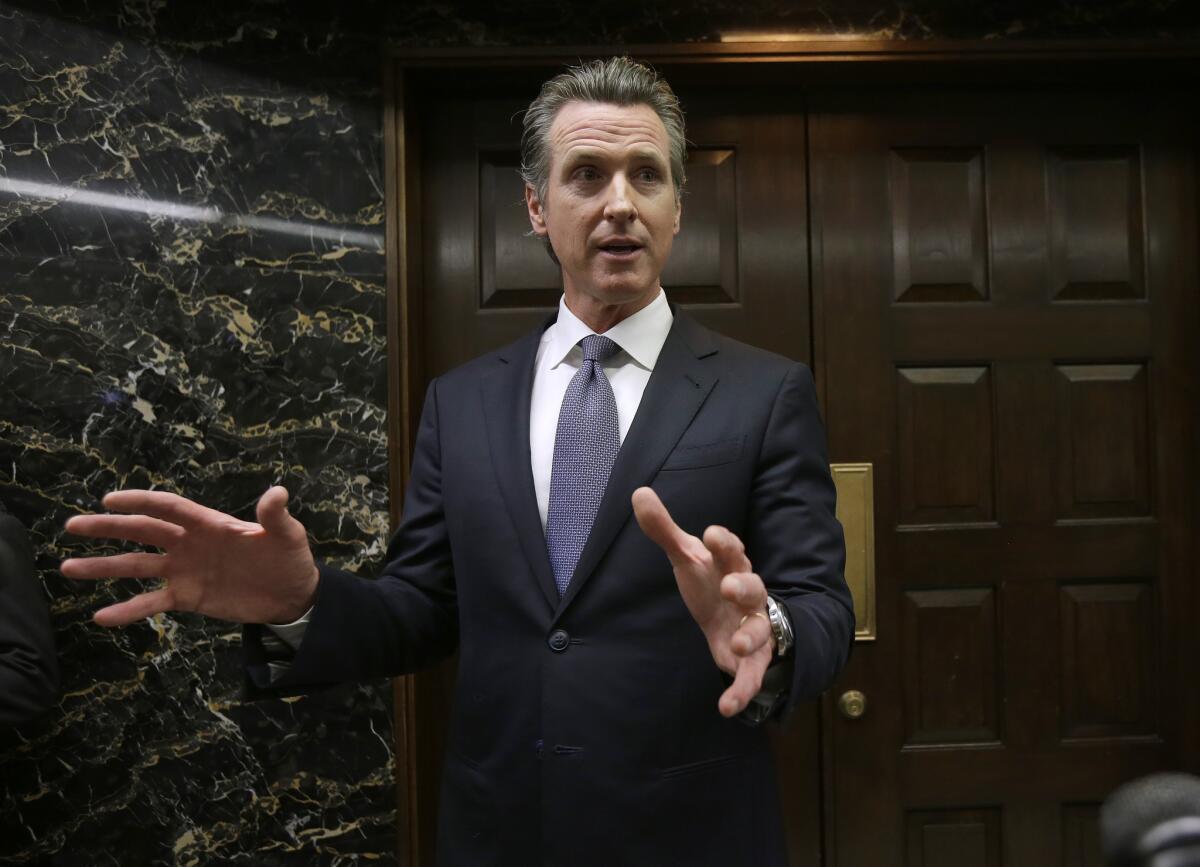PG&E’s future is in doubt after Newsom rejects bankruptcy plan

- Share via
SACRAMENTO — Gov. Gavin Newsom on Friday rejected Pacific Gas & Electric’s proposal to pull itself out of bankruptcy, saying its reorganization plan falls “woefully short” of safety requirements set under state law and demanding the company make major changes if it wants to access billions of dollars in a fund to pay wildfire claims.
The move complicates PG&E’s ability to remain in control of the company in a bankruptcy process that has seen financial interests vying to take over and local politicians preparing models for an entirely new utility. PG&E triggered the bankruptcy in January citing an estimated $30 billion in financial liabilities from California wildfires sparked by its equipment.
“In my judgment, the amended plan and the restructuring transactions do not result in a reorganized company positioned to provide safe, reliable, and affordable service to its customers, as required by AB 1054,” Newsom wrote in a letter to PG&E. “The state remains focused on meeting the needs of Californians including fair treatment of victims – not on which Wall Street financial interests fund an exit from bankruptcy.”
Newsom’s approval was not required under state law, but PG&E asked the governor to weigh in after reaching a $13.5-billion settlement with victims of some of California’s worst wildfires on record last week.
The request was a political gamble for the company, which gave Newsom and his team of advisors five days to review whether the proposal fulfilled the requirements of a new state law that allows utilities that meet certain requirements to dip into a fund to pay costs from California wildfires. Without access to the fund, Newsom said the company’s plan isn’t feasible.
PG&E pushed back and said it believes the plan conforms to requirements under state law. Jennifer Robison, a spokeswoman for the company, said PG&E was committed to working “diligently in the coming days to resolve any issues that may arise.” The company has until Tuesday to revise its proposal.
The request for the governor’s blessing forced Newsom to take a public position on the company’s reorganization long before state regulators perform an extensive review and must formally sign off on the PG&E proposal or a competing plan next year.
Rejecting the plan could risk delaying the bankruptcy process and payments to wildfire victims, said Jared Ellias, a bankruptcy law professor at UC Hastings.
“The company is kind of saying now, ‘You’re going to have to sign off on this,’” Ellias said. “‘We’re not going to let you have the benefit of distance from what we’re doing. If you say no, this thing could crash and burn, and you’re going to own the wreckage.’”
Richard Bridgford, an attorney who is part of a team representing wildfire victims, said the bankruptcy involves complex matters and balancing multiple interests.
“I’m hopeful that all the parties can move together to finally provide compensation for the victims who have suffered for over two years and experienced death, serious personal injury, loss of real and personal property and endured severe emotional distress, but in a manner that guarantees we avoid PG&E’s past mistakes and these fires — which is clearly where the governor is coming from,” he said.
In order to access the wildfire fund, Assembly Bill 1054 requires PG&E to exit bankruptcy by June 30, 2020, satisfy wildfire claims, preserve its efforts to meet the state’s climate goals and establish a governance structure that prioritizes safety.
Among his list of concerns, Newsom said the utility should have a new board of directors and a better financial model to ensure that ratepayers aren’t saddled with high rate increases to fund future safety investments.
“PG&E’s board of directors and management have a responsibility to immediately develop a feasible plan,” Newsom said. “Anything else is irresponsible, a breach of fiduciary duties, and a clear violation of the public trust.”
A UC Berkeley Institute of Governmental Studies poll conducted last month for the Los Angeles Times shows Californians share Newsom’s concerns — fewer than 1 in 8 likely voters surveyed want PG&E to fix its own problems and maintain its current structure once it emerges from bankruptcy.
“We all know that we can’t trust PG&E to do the right thing or even follow the law,” state Sen. Bill Dodd (D-Napa) said. “We need to achieve systemic change in the structure and governance of PG&E to ensure safe, reliable power. The stakes for California are too high to leave it to PG&E executives and their narrow self-interests.”
Newsom has become a vocal critic of PG&E during his first year in office, taking the company to task in October as public anger swelled in Northern California over power shut-offs that left millions of customers in the dark for days on end. He has committed to increasing state oversight of the troubled company and has said the state’s ongoing intervention in the bankruptcy process would help ensure the utility that emerges from bankruptcy prioritizes safe, reliable and affordable service.
The governor held a news conference in early November and threatened to craft his own reorganization plan unless PG&E quickly reached settlement agreements with wildfire victims and other parties in the bankruptcy, and came up with a proposal that fulfilled the requirements of AB 1054. Newsom has charged his cabinet secretary Ana Matosantos to lead a task force to develop a state-backed proposal.
More to Read
Sign up for Essential California
The most important California stories and recommendations in your inbox every morning.
You may occasionally receive promotional content from the Los Angeles Times.











